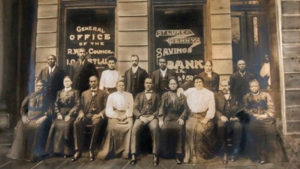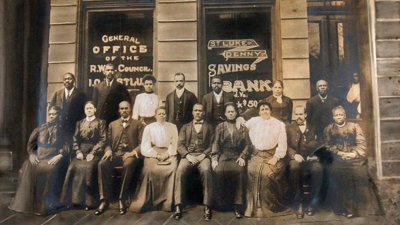
Business is much on our minds at The HistoryMakers. Not only are we in the midst of assembling the nation’s largest repository of video oral history on the subject of Blacks in business, but PBS recently aired An Evening with Ken Chenault, which is airing again this week along with our premiere of BOSS, the two-hour long feature of the Black experience in business. BOSS has received rave reviews including one from Mary Wilson of The Supremes who noted, “It was riveting I could not take my eyes off it.” While BOSS represents an important start, it is by no means comprehensive. There are many, many stories within The HistoryMakers archive and still more that have not been documented. Consider the following:
While most Black businesses showed surprising growth and diversity leading up to the Civil War, what enabled their success was the Black participation in the banking system. Leading into the early twentieth century, Black-owned insurance companies, caterers, funeral homes and burial services were among the emerging industries for Black entrepreneurs including John Merrick who founded North Carolina Mutual Life in 1899 to become the nation’s largest Black insurance company, and Alonzo Franklin Herndon, who was born a slave and made his fortune as a barber and then as a real estate investor. He ultimately purchased a failing mutual aid society and turned it into the Atlanta Life Insurance Company. The late former CEO of Atlanta Life Financial Group, Ronald Brown recalled, “Alonzo Franklin Herndon, who was a former slave, had what was then referred to as the finest barbershop in the Southeast, and all of his customers were white. And they did not even know that Mr. Herndon owned the barbershop. They thought he worked there. And to make them feel comfortable, he actually would enter through the back door of his own establishment.”
Coupled with white resistance and the global economic collapse during the Great Depression, Black businesses were hit particularly hard. What followed were some of the greatest Black entrepreneurs like A.G. Gaston, who owned a number of businesses and played a significant role in the struggle to integrate Birmingham in 1963. Real estate entrepreneur and civil rights activist Joe Dickson remembered how Gaston gave him $200 a week so he could study and pass the bar exam. Entrepreneur Comer Joseph Cottrell recalled his father’s advice to Gaston to start an insurance company, “He met A.G. Gaston, who had a funeral home, and he befriended A.G. and told him about the insurance business and told him that since he had a funeral home, that in the State of Alabama at the time, you weren’t required to have a certain capitalization to start a burial insurance company. All you had to have is a funeral home with the ability to bury the people. So, my dad talked him into setting up a burial insurance company and that was Booker T. Washington Insurance.”
There is also, of course, the histories of individuals like S.B. Fuller, featured in the BOSS film, who built an empire of personal care products with Fuller Products and became the largest Black-owned business from the 1940s to the early 1960s. Fuller also served as a role model for George Johnson who founded Johnson Products. Johnson reflected on how Fuller got his start, “He started with twenty-five dollars, which was a refund from insurance on his car. He took that twenty-five dollars, and he bought soap, and he hand-made labels, put them on the soap, and started selling soap with the money that he got from that. From that he turned it into soap, and he turned the soap into money, just turning that over. And eventually he added other things, and that was the start of Fuller Products in 1936.” Johnson Products would go on to be the first African American company listed on the American Stock Exchange. That legacy of entrepreneurship was not lost on Johnson’s son Eric Johnson who later bought Baldwin Ice Cream Company, which he merged with Richardson Foods to become Baldwin Richardson Foods and has grown it into a $300 million company.
Soft Sheen hair care company founders Edward and Bettiann Gardner launched their hair care empire from their basement, Bettiann Gardner recalled how her husband would experiment with new products to sell. After several rejections and modifications, her husband noted, “I went back in the basement and started putting my pot back on again and started taking some wax out and doing a lot of things to it.” When he found something that worked, his wife said, “I’m gonna go down there in the basement with you with my pad and pencil and I’m gonna write down everything you put in and the quantity. So that it will become a formula and you’ll be able to duplicate it every time the same way.”
While BOSS features John H. Johnson, founder of Johnson Publishing Company and Earl Graves, founder of Black Enterprise magazine it does not touch upon Edward Lewis, Clarence O. Smith, Cecil Hollingsworth and Jonathan Blount, founders of Essence magazine or Bob Johnson the founder of BET or Oprah Winfrey, all media moguls in their own right. And then there is Reverend Jesse Jackson and his role in the financial industry with the Wall Street Project. This is the just the tip of the iceberg, and it is our goal to bring more stories to light.

